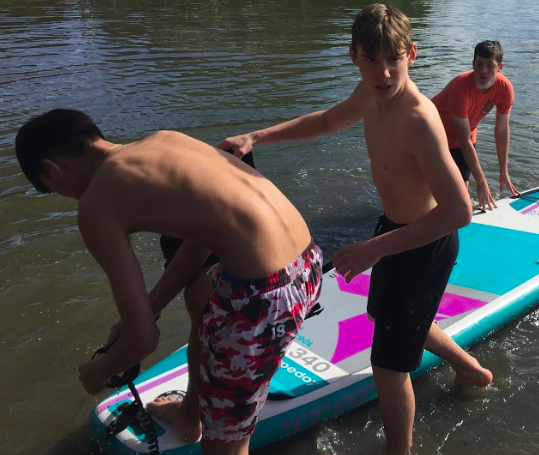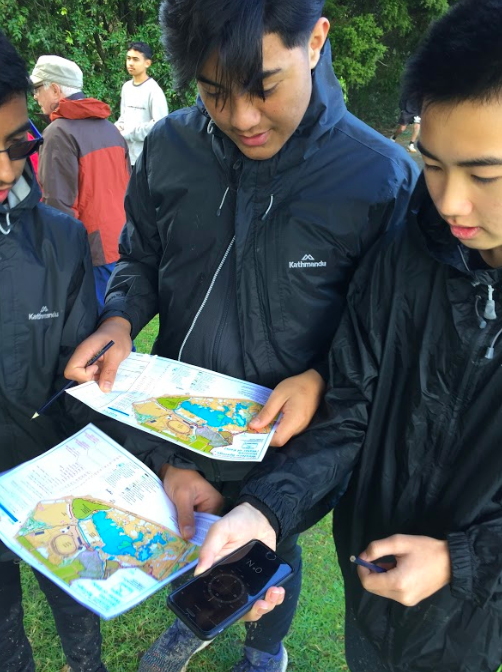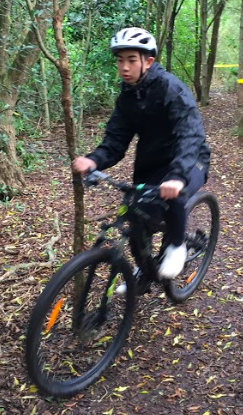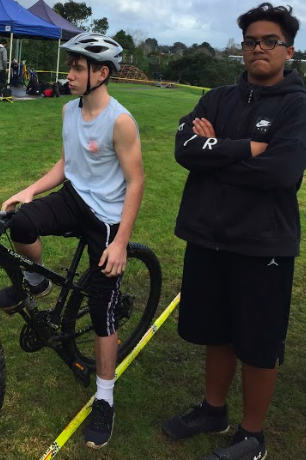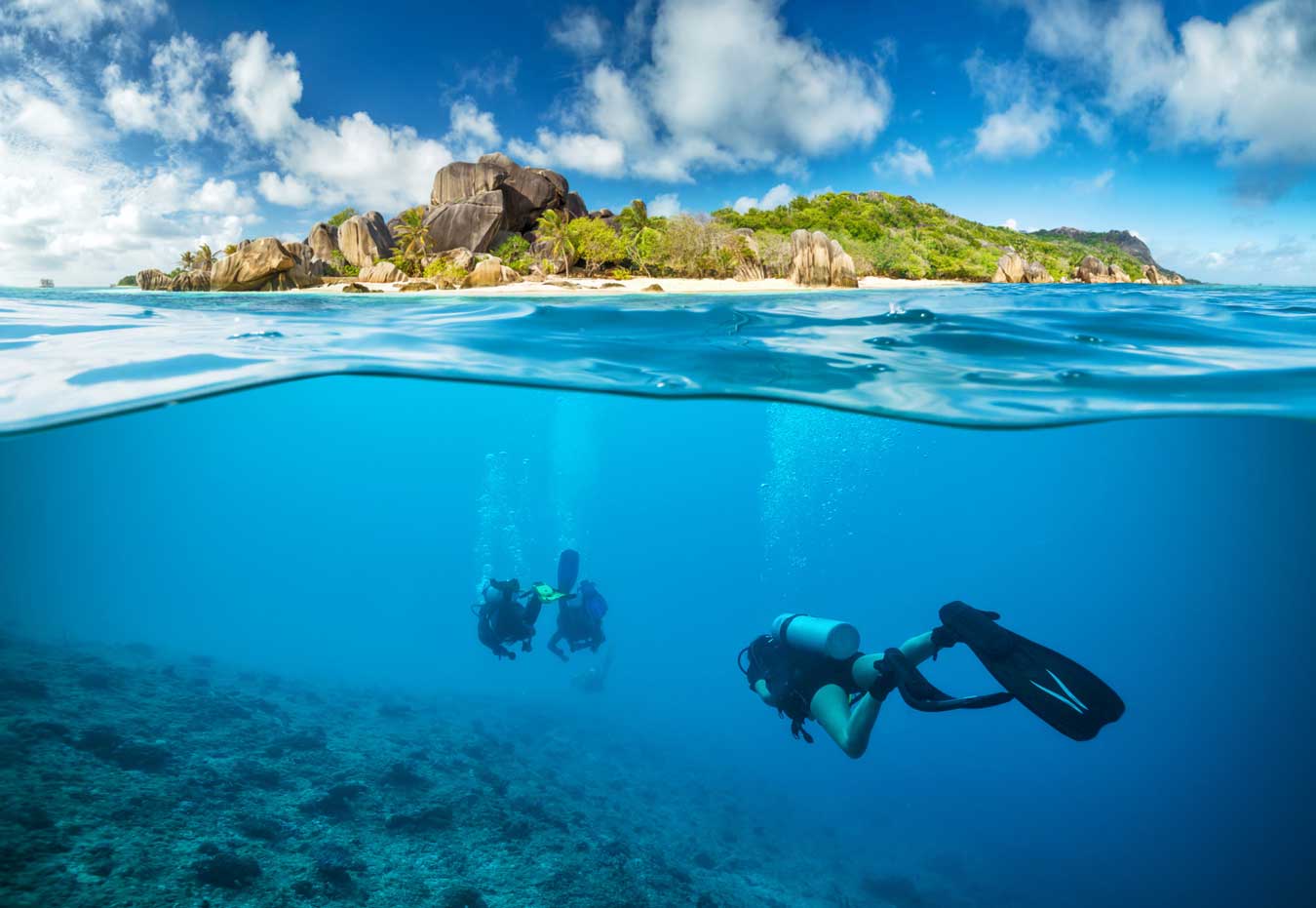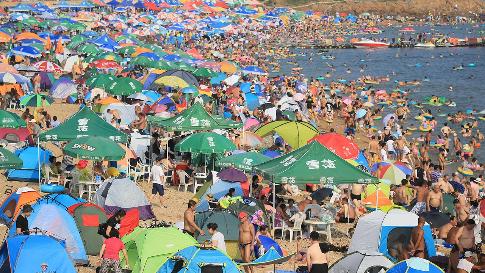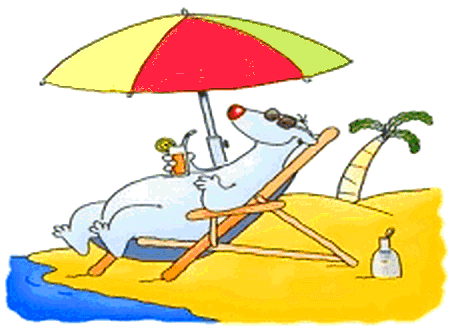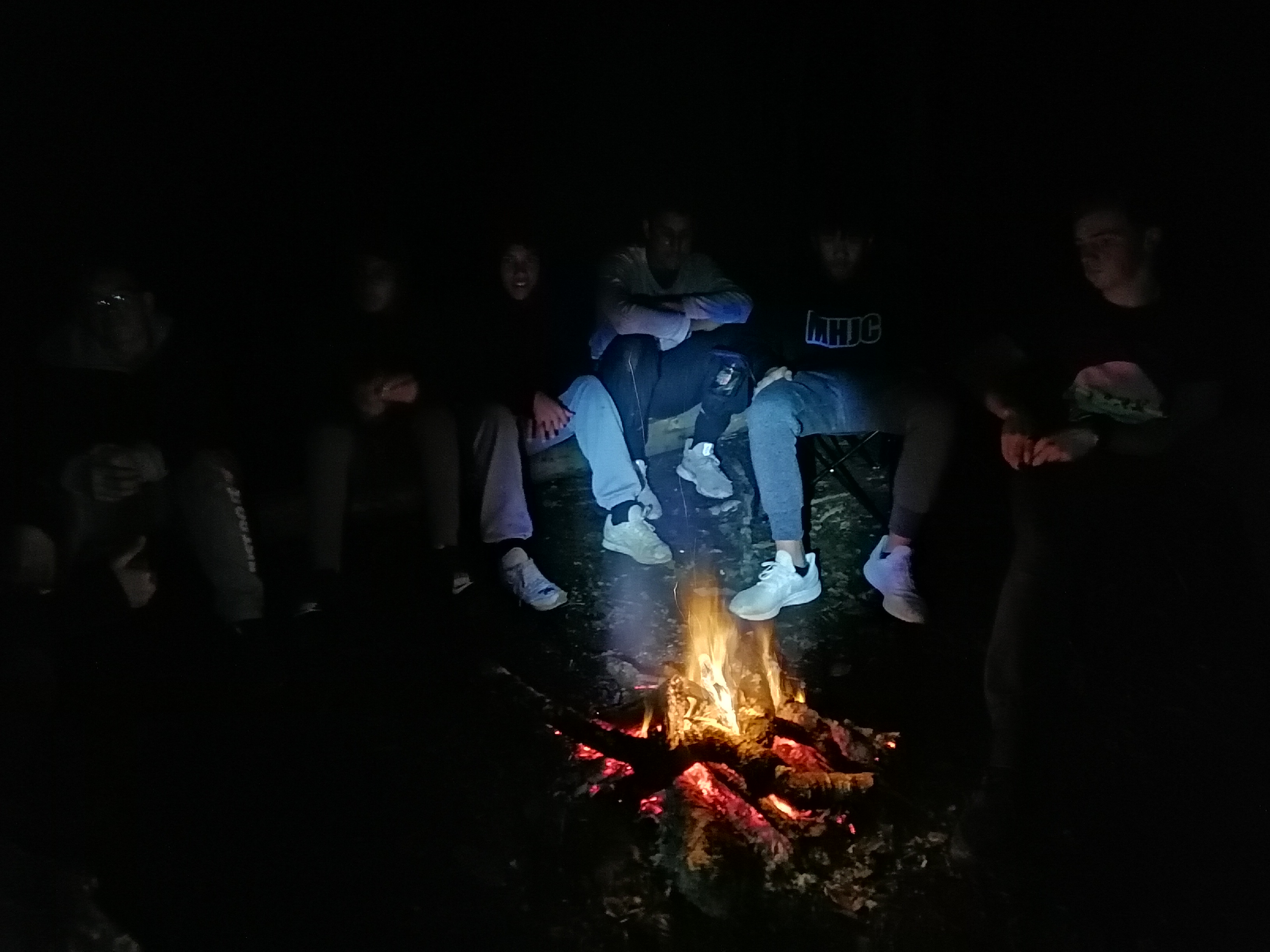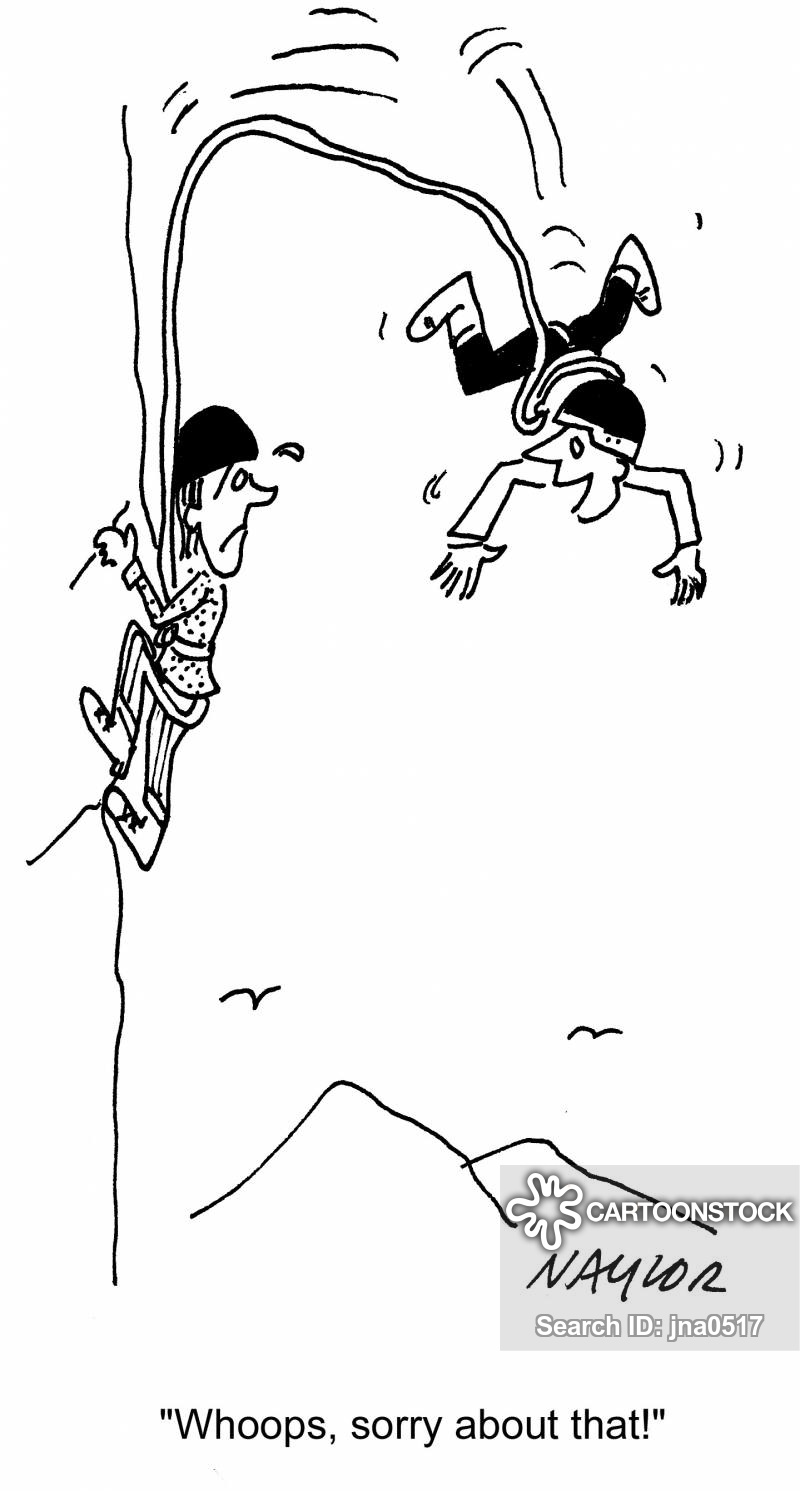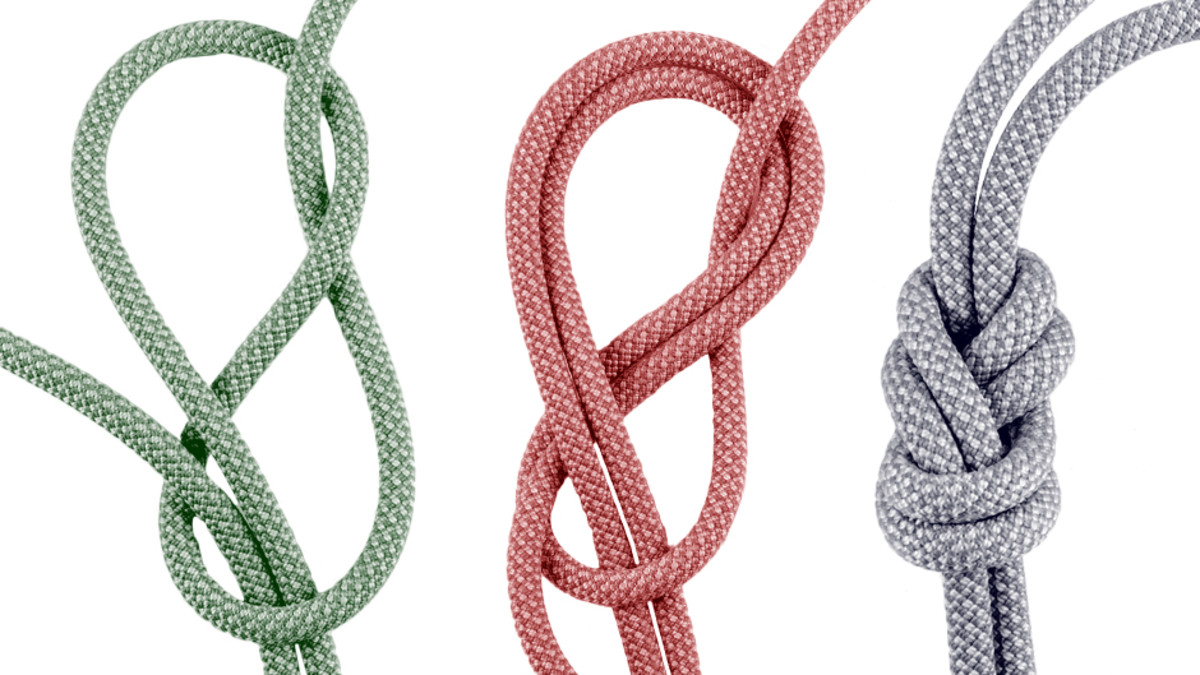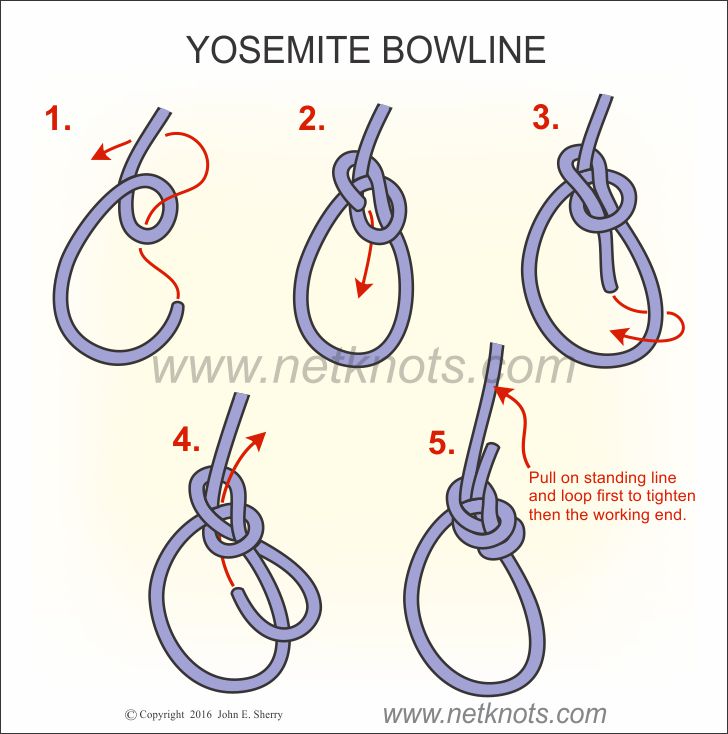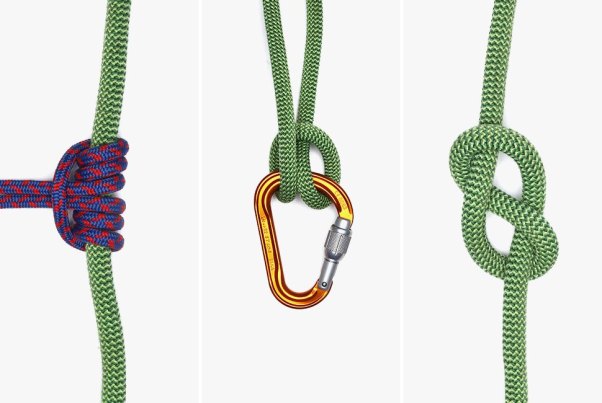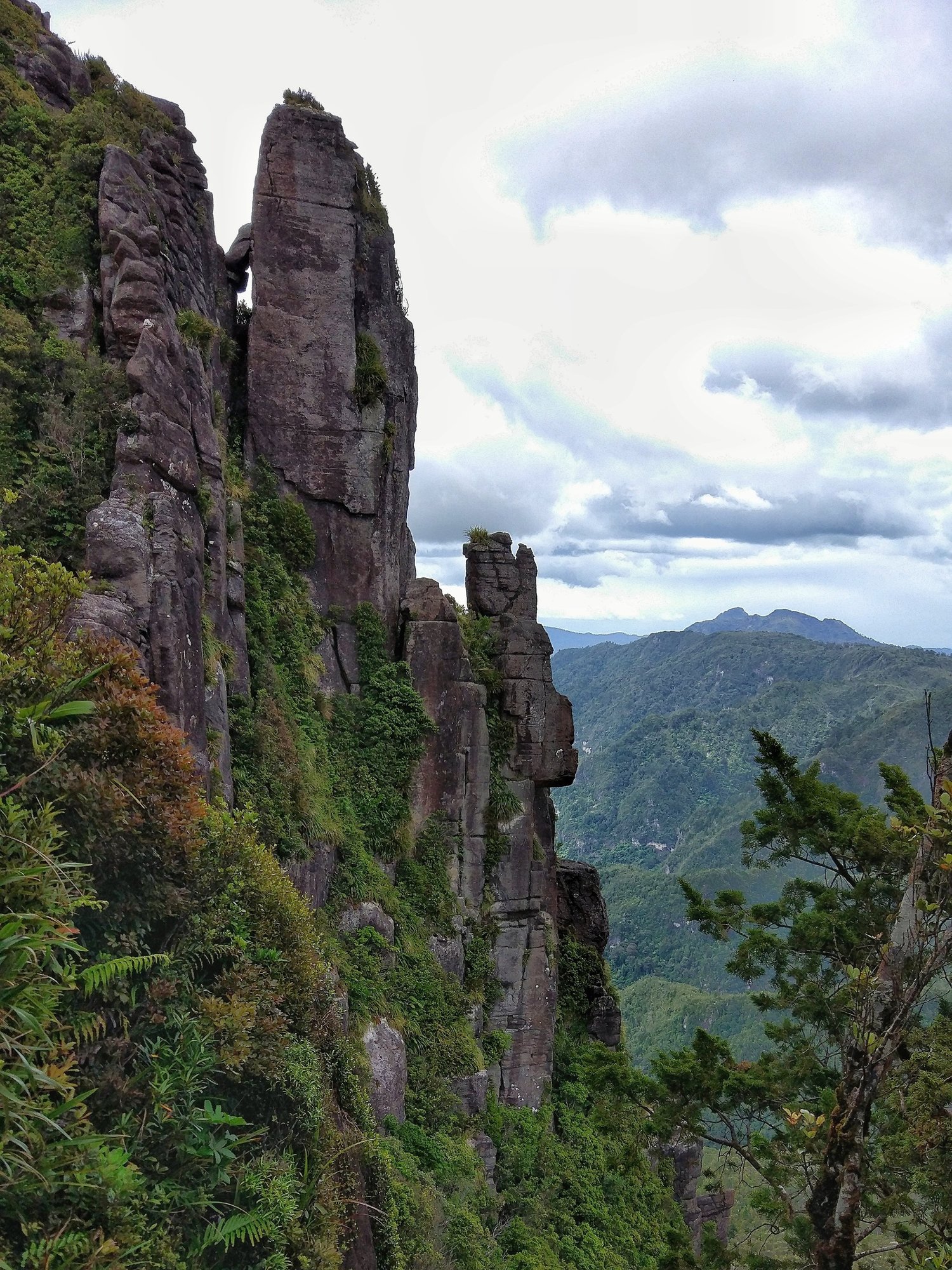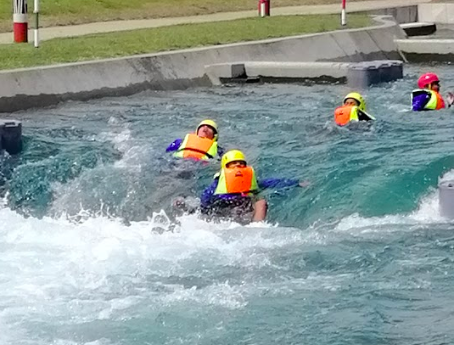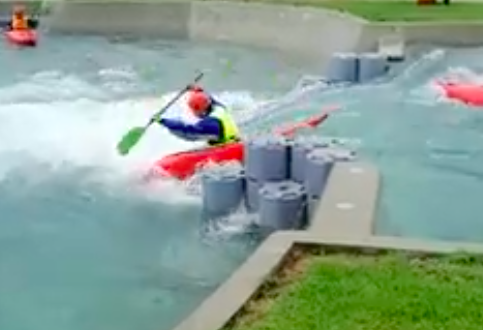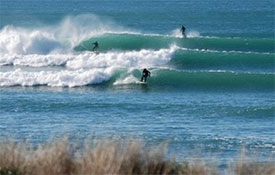10 Outdoor Education 1
Section outline
-
This year, you will:
- build knowledge, skills & attitudes for success
- plan, implement & review safe, challenging and enjoyable outdoor activities
- learn to succeed in unfamiliar situations, both individually and in groups
- co-operate, solve problems, communicate, lead, take responsibility
- understand how we can sustain a healthy environment
- learn to access local outdoor recreation opportunities
Our course is guided by the NZ Curriculum .
Level 5 Heath & PE relevant achievement objectives:
A2 Participate in regular physical activity and describe how this contributes to a balanced lifestyle.
A3 Investigate & practise safety procedures & strategies to manage risk situations.
B1 Acquire & apply complex motor skills by using basic principles of motor learning.
B2 Develop skills and responsible attitudes in challenging physical situations.
B3 Investigate & experience how science, technology & environment knowledge influence participation
eg weather, anatomy (hypothermia), geology, diseases (eg Kauri dieback).
C3 Demonstrate interpersonal skills that help to make safe choices in a variety of settings.Level 5 Social Sciences relevant achievement objectives:
Summary of activities:
Understand how people’s management of resources impacts on environmental and social sustainability.
Term 1: Team ABL problem solving, kayaking, First Aid, navigation (incl. orienteering)
Term 2: Mountain biking, campcraft, overnight camping
Term 3: Climbing, risk assessment, trip planning, weather, overnight tramping
Term 4: Environmental sustainability, Extended expedition?
Assessment:
You'll be self and peer assessed, based on observations and learning journal reflections:
- how much your skills progress over time
- how much knowledge you gain & apply
- your attitude & team spirit in challenging situationsBackground readings on the outdoors
Interactive quizzes on the outdoors
-
Assessment Instructions
As we’ve explored camping, tramping, navigation, weather and safety skills, we’ve learned how to plan and organise challenging, but safe, fun in the outdoors.
You’ve had opportunities to:
Discover camping and tramping skills and knowledge
Experimented with map and compass use
Studied how to predict the weather and use our understanding to inform trip decisions
Identified hazards and risks, and learned how to minimise these
Assessment Task
You are required to:
Plan and prepare for a group trip to a specific outdoor location (eg Kauaeranga Valley)
Whilst at the location, present information to the group about flora, fauna, geology and history
Apply your camping, weather, navigation and tramping skills to lead the group safely on the journey
-
This term's activities include kayaking, first aid and navigation including orienteering.
Schedule of days & times.
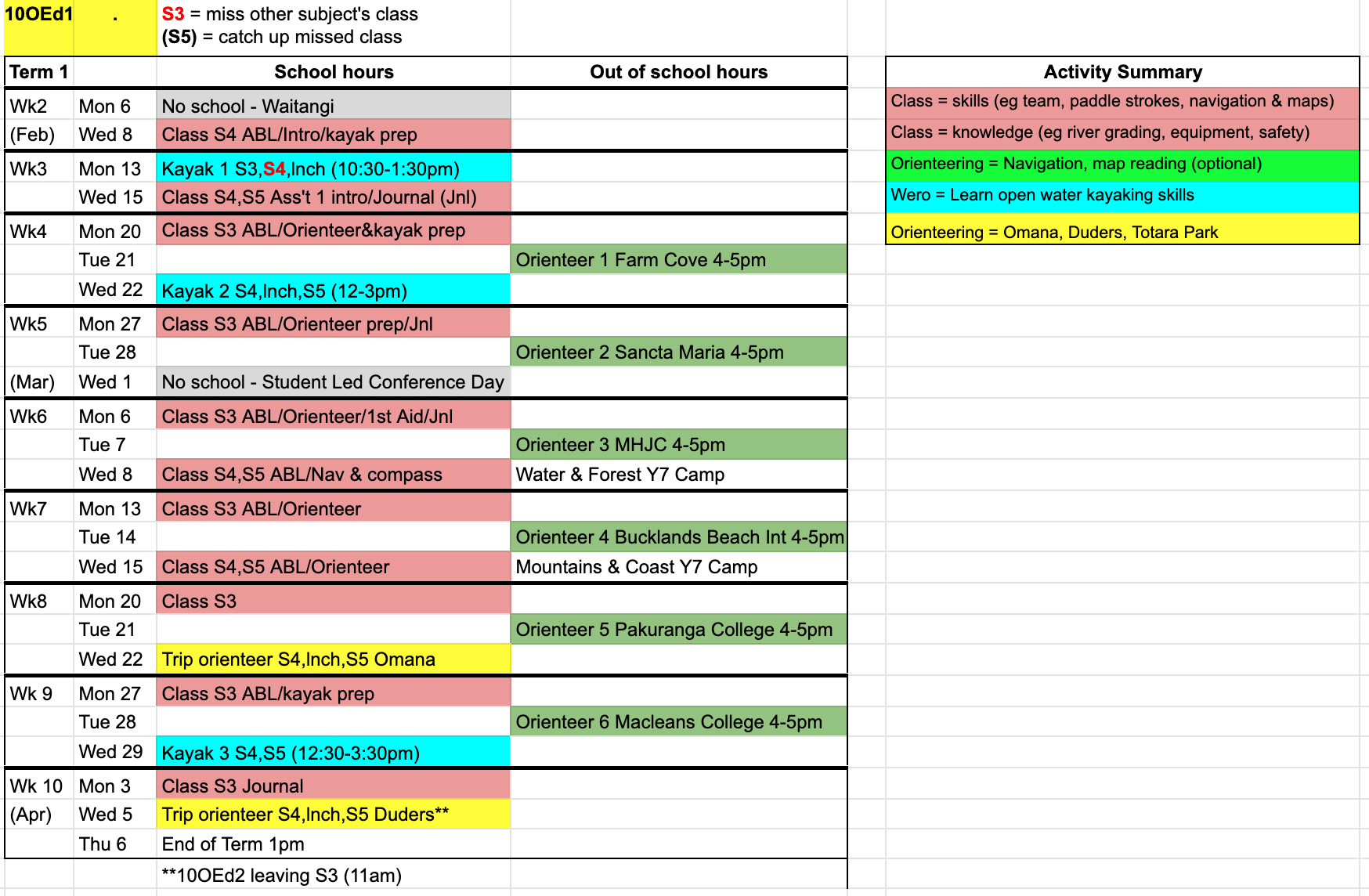
-
EXPLORE / TŪHURA learning intentions:
- We are EXPLORING … interpersonal skills by… connecting with other members of my class during ABL sessions and outdoor activities.
- We are EXPLORING … white water kayaking by… discovering a new enjoyable activity and how it contributes to personal well being.
- We are EXPLORING … mountain biking by… discovering a new enjoyable activity and how it contributes to personal well being.
- We are EXPLORING … rock climbing by… discovering a new enjoyable activity and how it contributes to personal well being.
- We are EXPLORING … orienteering by… discovering a new enjoyable activity and how it contributes to personal well being.
FOCUS / ARONGA learning intentions:
- We are FOCUSING on … movement skills by… developing knowledge of motor skills required for a variety of outdoor activities.
- We are FOCUSING on … positive attitudes by… identifying the attitudes required to accept challenges, learn new skills and strategies, and extend my abilities in a variety of outdoor activities.
EXPLORE / TŪHURA learning intentions:
- We are EXPLORING … interpersonal skills by… connecting with other members of my class during ABL sessions and outdoor activities.

- We are EXPLORING … white water kayaking by… discovering a new enjoyable activity and how it contributes to personal well being.
FOCUS / ARONGA learning intentions:
- We are FOCUSING on … movement skills by… developing knowledge of motor skills required for a variety of outdoor activities.
- We are FOCUSING on … positive attitudes by… identifying the attitudes required to accept challenges, learn new skills and strategies, and extend my abilities in a variety of outdoor activities.
PLAN & DO / WHAKAMAHI learning intentions:
- We are PLANNING … to attend outdoor education activities so that we can… demonstrate and practice our newly acquired skills in a physical environment.


Learning Intentions
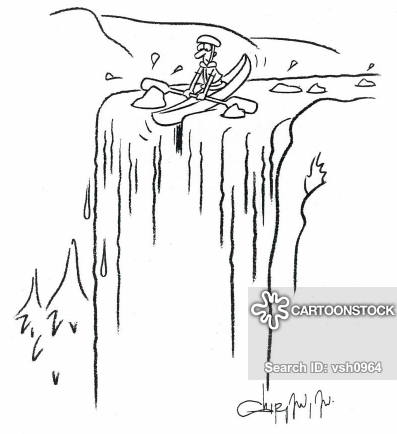
To learn to exit a kayak, swim to safety and to assist in being rescued.
To learn to break into and out of an eddy and fast moving water.
To learn paddle strokes, kayak control & positioning to navigate grade 2 water.
To learn how to prepare for a kayak session (safety gear, clothes, signals, vocabulary)Success Criteria
Can ensure own safety and that of others when on moving water.
Can explain kayaking terms, methods & equipment.
Can kayak confidently and competently on grade 2 water.We'll discuss:
Pre-water boat check (air bag, foot rest, back support, bung, paddle length, boat volume)
Pre-water self check (buoyancy aid vs life jacket, clothes, helmet, spray skirt tag visible)
Power, sweep, draw, and support paddle strokes.
Drops, eddys, emptying boats, X-rescues, capsizes and '3 bangs on hull'.Assessment
Your kayaking will contribute towards Assessment 1 and will be self and teacher / instructor assessed.
Self-assessment: part of the evidence for your grade will come from your reflections in your learning journal.
Teacher / Instructor assessment: other evidence will come from observations and conversations during the sessions regarding your contribution, team work and skills developmentIn your Learning Journal, you should reflect on how you've developed your skills, knowledge and attitude. Here's an example entry:
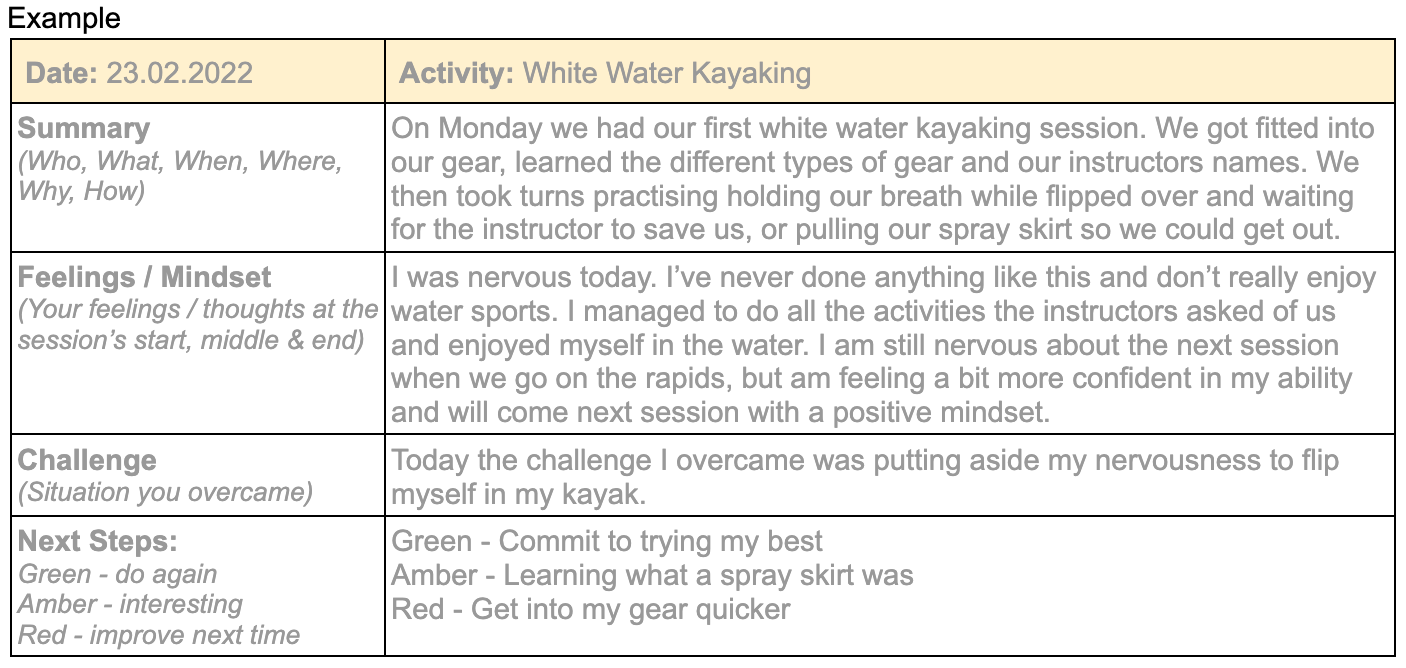
Here's some scribbles to jog your memory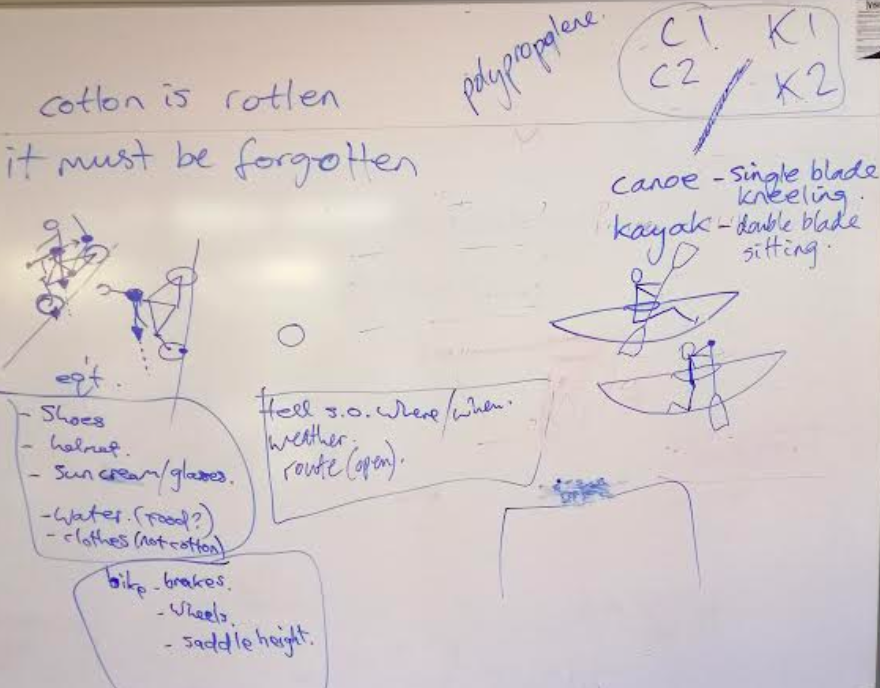
Activities:
Monday - Kayaking at Wero
10:30 - Changed in the car park. With lunch, water and required gear from checklist. Return to School 1pm
Rain Plan - ABL activity - Getting to know each other. Form class contract - 'for being a GREAT CLASS'
Students to watch supporting Kayaking videos
Wednesday - Reflection and Journal (introduce journal)
10 OED Journal Link - Share to students.
https://docs.google.com/document/d/10gEwIX3OZ1_Tj_tUAjO3__xMXjRVEV07hSQ1mhtqxRk/edit
ABL activities - Name Game, Silent Line, Bench Pass and Toxic Waste
-
EXPLORE / TŪHURA learning intentions:
- We are EXPLORING … interpersonal skills by… connecting with other members of my class during ABL sessions and outdoor activities.
- We are EXPLORING … white water kayaking by… discovering a new enjoyable activity and how it contributes to personal well being.
- We are EXPLORING … orienteering by… discovering a new enjoyable activity and how it contributes to personal well being.
FOCUS / ARONGA learning intentions:
- We are FOCUSING on … movement skills by… developing knowledge of motor skills required for a variety of outdoor activities.
- We are FOCUSING on … positive attitudes by… identifying the attitudes required to accept challenges, learn new skills and strategies, and extend my abilities in a variety of outdoor activities.
Learning Intentions
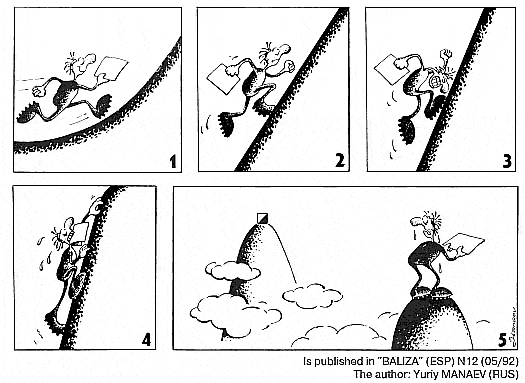
To learn to read an orienteering map (scale, features, contours, orientation).
To learn to navigate a prepared course (distances, direction, pace).
To experience participating in an organised local orienteering event.Success Criteria
Can orientate a map and use a compass.
Can understand map features and navigate efficiently on varied terrain.We'll discuss:
- Orientating maps with & without a compass)
- Relating map symbols to terrain and vice versa
- Orienteering symbols
- Skills (eg thumbing the map to follow ground progress)
- Tactics to complete a course individually and within the set time.Monday - Reflection and Journal (introduce journal)
10 OED Journal Link - Share to students.
https://docs.google.com/document/d/10gEwIX3OZ1_Tj_tUAjO3__xMXjRVEV07hSQ1mhtqxRk/edit
ABL activities - Name Game, Silent Line, Bench Pass and Toxic Waste
Wednesday - Kayaking at Wero
10:30 - Changed in the car park. With lunch, water and required gear from checklist. Return to School 1pm
Rain Plan - ABL activity - Getting to know each other. Form class contract - 'for being a GREAT CLASS'
Students to watch supporting Kayaking videos
-
EXPLORE / TŪHURA learning intentions:
- We are EXPLORING … interpersonal skills by… connecting with other members of my class during ABL sessions and outdoor activities.
- We are EXPLORING … white water kayaking by… discovering a new enjoyable activity and how it contributes to personal well being.
- We are EXPLORING … orienteering by… discovering a new enjoyable activity and how it contributes to personal well being.
FOCUS / ARONGA learning intentions:
- We are FOCUSING on … movement skills by… developing knowledge of motor skills required for a variety of outdoor activities.
- We are FOCUSING on … positive attitudes by… identifying the attitudes required to accept challenges, learn new skills and strategies, and extend my abilities in a variety of outdoor activities.
REFLECT / WHAIWHAKAARO learning intentions:
- We are REFLECTING on … movement skills and positive attitudes by… evaluating our experiences from a variety of outdoor experiences.
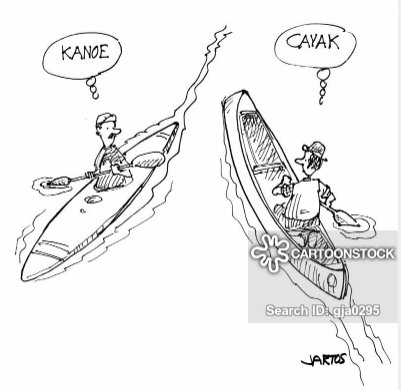 The NCEA unit standards below are a rough guide to our learning. Their content will help you to complete your LEARNING JOURNAL.
The NCEA unit standards below are a rough guide to our learning. Their content will help you to complete your LEARNING JOURNAL.NCEA Unit Std 20818 L1 (2 credits) Demonstrate kayaking skills on sheltered or slow-moving water
Resources
NCEA Unit Std 476 L2 (2 credits) Roll a kayak
One to aim for in future:
NCEA Unit Std 20121 L2 (4 credits) Demonstrate kayaking skills on Grade II whitewater
Videos
Kayaking basics
Learn to roll tutorials 1,2,3.
Extreme waterfall kayaking!
-
EXPLORE / TŪHURA learning intentions:
- We are EXPLORING … interpersonal skills by… connecting with other members of my class during ABL sessions and outdoor activities.
- We are EXPLORING … health and safety (personal safety and safety of others) by… analysing the risks and selecting the appropriate strategy to in response to the first aid scenario.
- We are EXPLORING … orienteering by… discovering a new enjoyable activity and how it contributes to personal well being.
FOCUS / ARONGA learning intentions:
- We are FOCUSING on … movement skills by… developing knowledge of motor skills required for a variety of outdoor activities.
- We are FOCUSING on … positive attitudes by… identifying the attitudes required to accept challenges, learn new skills and strategies, and extend my abilities in a variety of outdoor activities.
REFLECT / WHAIWHAKAARO learning intentions:
- We are REFLECTING on … movement skills and positive attitudes by… evaluating our experiences from a variety of outdoor activities.
PLAN & DO / WHAKAMAHI learning intentions:
- We are PLANNING … to attend outdoor education activities so that we can… demonstrate and practice our newly acquired skills in a physical environment.
The NCEA unit standards below are a rough guide to our learning. Their content will help you to complete your LEARNING JOURNAL.
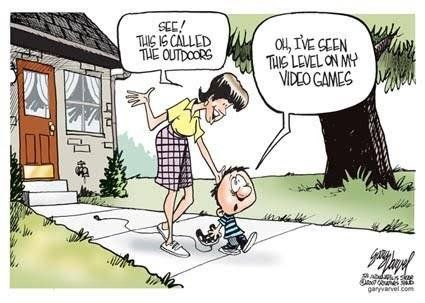 NCEA Unit Std 20141 L1 (1 credit) Complete beginner orienteering courses
NCEA Unit Std 20141 L1 (1 credit) Complete beginner orienteering courses
NCEA Unit Std 5479 L2 (1 credit) Complete white and yellow grade orienteering coursesResources & videos
- Irish Orienteering Association website - 10 Elements of Orienteering
- Orienteering USA website - Orienteering Technique
-
Kiwi-O Orienteering Skills resource
- SA Orienteering Federation website ‘O in a Box #1’ basics - Map orientation, symbols, objects
-
SA Orienteering Federation website ‘O in a Box #2’ basics - Map symbols, control descriptions
- Auckland Orienteering club website
Activities: RWH Monday and Wednesday Double
Wk6 Mon 6 Class S3 ABL/Orienteer/1st Aid/Jnl Tue 7 Orienteer 3 MHJC 4-5pm Wed 8 Class S4,S5 ABL/Nav & compass Water & Forest Y7 Camp -
EXPLORE / TŪHURA learning intentions:
- We are EXPLORING … interpersonal skills by… connecting with other members of my class during ABL sessions and outdoor activities.
- We are EXPLORING … white water kayaking by… discovering a new enjoyable activity and how it contributes to personal well being.
- We are EXPLORING … mountain biking by… discovering a new enjoyable activity and how it contributes to personal well being.
- We are EXPLORING … rock climbing by… discovering a new enjoyable activity and how it contributes to personal well being.
- We are EXPLORING … orienteering by… discovering a new enjoyable activity and how it contributes to personal well being.
FOCUS / ARONGA learning intentions:
- We are FOCUSING on … movement skills by… developing knowledge of motor skills required for a variety of outdoor activities.
- We are FOCUSING on … positive attitudes by… identifying the attitudes required to accept challenges, learn new skills and strategies, and extend my abilities in a variety of outdoor activities.
REFLECT / WHAIWHAKAARO learning intentions:
- We are REFLECTING on … movement skills and positive attitudes by… evaluating our experiences during white water kayaking, mountain biking, rock climbing trips, orienteering.
PLAN & DO / WHAKAMAHI learning intentions:
- We are PLANNING … to attend outdoor education activities so that we can… demonstrate and practice our newly acquired skills in a physical environment.
We're now getting ready for our Pinnacles trip.
Here we'll look at maps:- scale (eg 1:50,000) and distances (horizontal map distance & slope walking distance)
- gridlines (true / magnetic / true north)
- longitude and latitude
- features (roads, buildings, cliffs, streams)
And, we'll look at compasses:
- Adjusting for the difference between magnetic and grid north
- Bearings from map and from land
Resources
- Reading a map
- Using a compass
- Download any NZ 1:50,000 topographical map here https://www.linz.govt.nz/land/maps/linz-topographic-maps/map-chooser/map-chooser---bq31
Activities: RWH Monday and Wednesdays DEEP
Wk7 Mon 13 Class S3 ABL/Orienteer Tue 14 Orienteer 4 Bucklands Beach Int 4-5pm Wed 15 Class S4,S5 ABL/Orienteer Mountains & Coast Y7 Camp Wk8 Mon 20 Class S3 Tue 21 Orienteer 5 Pakuranga College 4-5pm Wed 22 Trip orienteer S4,lunch,S5 Omana -
EXPLORE / TŪHURA learning intentions:
- We are EXPLORING … interpersonal skills by… connecting with other members of my class during ABL sessions and outdoor activities.
- We are EXPLORING … white water kayaking by… discovering a new enjoyable activity and how it contributes to personal well being.
- We are EXPLORING … mountain biking by… discovering a new enjoyable activity and how it contributes to personal well being.
- We are EXPLORING … rock climbing by… discovering a new enjoyable activity and how it contributes to personal well being.
- We are EXPLORING … orienteering by… discovering a new enjoyable activity and how it contributes to personal well being.
FOCUS / ARONGA learning intentions:
- We are FOCUSING on … movement skills by… developing knowledge of motor skills required for a variety of outdoor activities.
- We are FOCUSING on … positive attitudes by… identifying the attitudes required to accept challenges, learn new skills and strategies, and extend my abilities in a variety of outdoor activities.
REFLECT / WHAIWHAKAARO learning intentions:
- We are REFLECTING on … movement skills and positive attitudes by… evaluating our experiences during white water kayaking, mountain biking, rock climbing trips, orienteering.
PLAN & DO / WHAKAMAHI learning intentions:
- We are PLANNING … to attend outdoor education activities so that we can… demonstrate and practice our newly acquired skills in a physical environment.
 Learning Intentions
Learning Intentions
To learn to help someone using first aid methods eg CPRABCD.
To learn to ride on a variety of surfaces (roots, sand, mud, ruts).
To learn balance, body position, braking and steering to navigate intermediate tracks.Success Criteria
Can make decisions to effectively manage a first aid situation.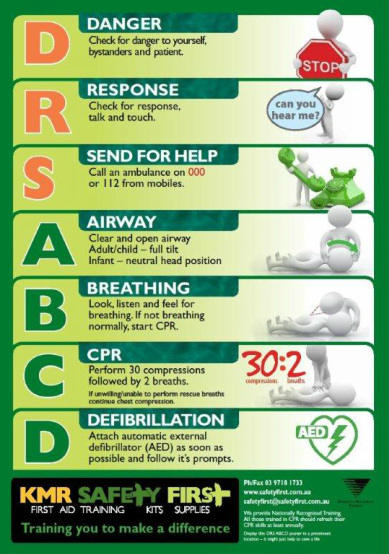
We'll discuss:
US6400 Head/spinal/chest injuries, internal bleeding, burns, allergic reactions, heat related conditions, multiple injury scenarios.
US6401 Patient management, shock, bleeding, medical conditions, heart attack, poisoning, fractures, soft tissue & eye injuries
US6402 Identifying hazards (traffic & infection), seeking help, CPR (adult/child/baby) & defibrillation, choking (adult/child/baby), casualty management.
As a rough guide to our learning, we'll use the NCEA unit standards below. The content in these standards will help you when you complete you LEARNING JOURNAL, which will form part of your assessment.NCEA Unit Std 6402 L1 (1 credit) Provide basic life support
https://www.nzqa.govt.nz/ncea/assessment/view-detailed.do?standardNumber=6402
Resources
NCEA Unit Std 6401 L2 (1 credit) Provide first aid
https://www.nzqa.govt.nz/ncea/assessment/view-detailed.do?standardNumber=6401
And perhaps:
NCEA Unit Std 6400 L3 (2 credits) Manage first aid in an emergency situation
https://www.nzqa.govt.nz/ncea/assessment/view-detailed.do?standardNumber=6400Manukau Institute of Technology https://www.manukau.ac.nz/study/short-courses/first-aid/comprehensive-first-aid-certificate
Red Cross Outdoor 1st Aid 2-day course topics covered https://www.first-training.co.nz/first-aid-courses/outdoor-first-aid/outdoor-first-aid-2-day
Activities:
Wk 9 Mon 27 Class S3 ABL/kayak prep Tue 28 Orienteer 6 Macleans College 4-5pm Wed 29 Kayak 3 S4,S5 (12:30-3:30pm) Wk 10 Mon 3 Class S3 Journal (Apr) Wed 5 Trip orienteer S4,lunch,S5 Duders** Thu 6 End of Term 1pm -
This term's activities include mountain biking, campcraft & overnight camping.
Schedule of days & times.
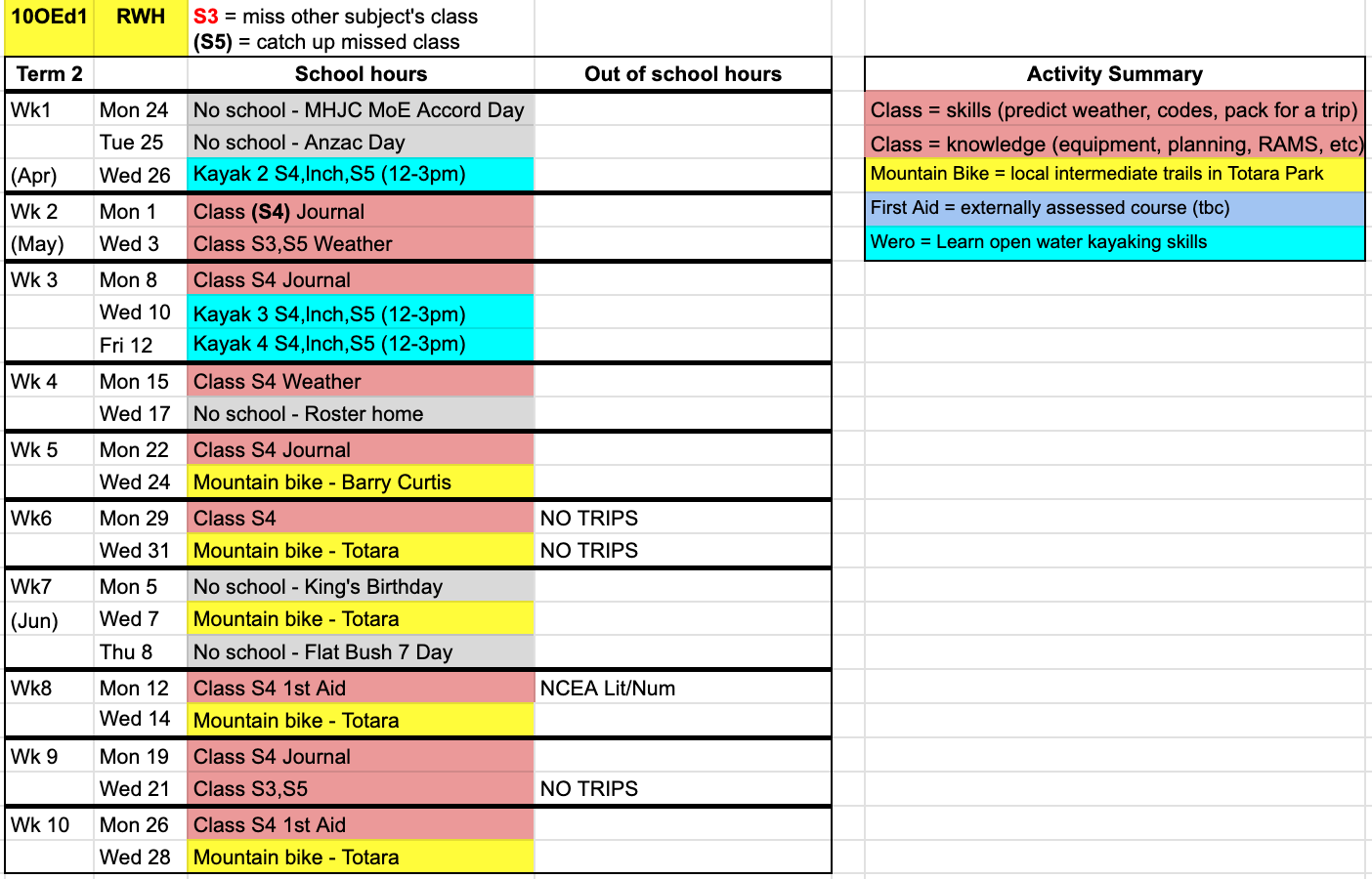
-
EXPLORE / TŪHURA learning intentions:
- We are EXPLORING … interpersonal skills by… connecting with other members of my class during ABL sessions and outdoor activities.
- We are EXPLORING … white water kayaking by… discovering a new enjoyable activity and how it contributes to personal well being.
- We are EXPLORING … mountain biking by… discovering a new enjoyable activity and how it contributes to personal well being.
- We are EXPLORING … rock climbing by… discovering a new enjoyable activity and how it contributes to personal well being.
- We are EXPLORING … orienteering by… discovering a new enjoyable activity and how it contributes to personal well being.
FOCUS / ARONGA learning intentions:
- We are FOCUSING on … movement skills by… developing knowledge of motor skills required for a variety of outdoor activities.
- We are FOCUSING on … positive attitudes by… identifying the attitudes required to accept challenges, learn new skills and strategies, and extend my abilities in a variety of outdoor activities.
FOCUS / ARONGA learning intentions:
- We are FOCUSING on … movement skills by… developing knowledge of motor skills required for a variety of outdoor activities.
- We are FOCUSING on … positive attitudes by… identifying the attitudes required to accept challenges, learn new skills and strategies, and extend my abilities in a variety of outdoor activities.
Learning Intentions
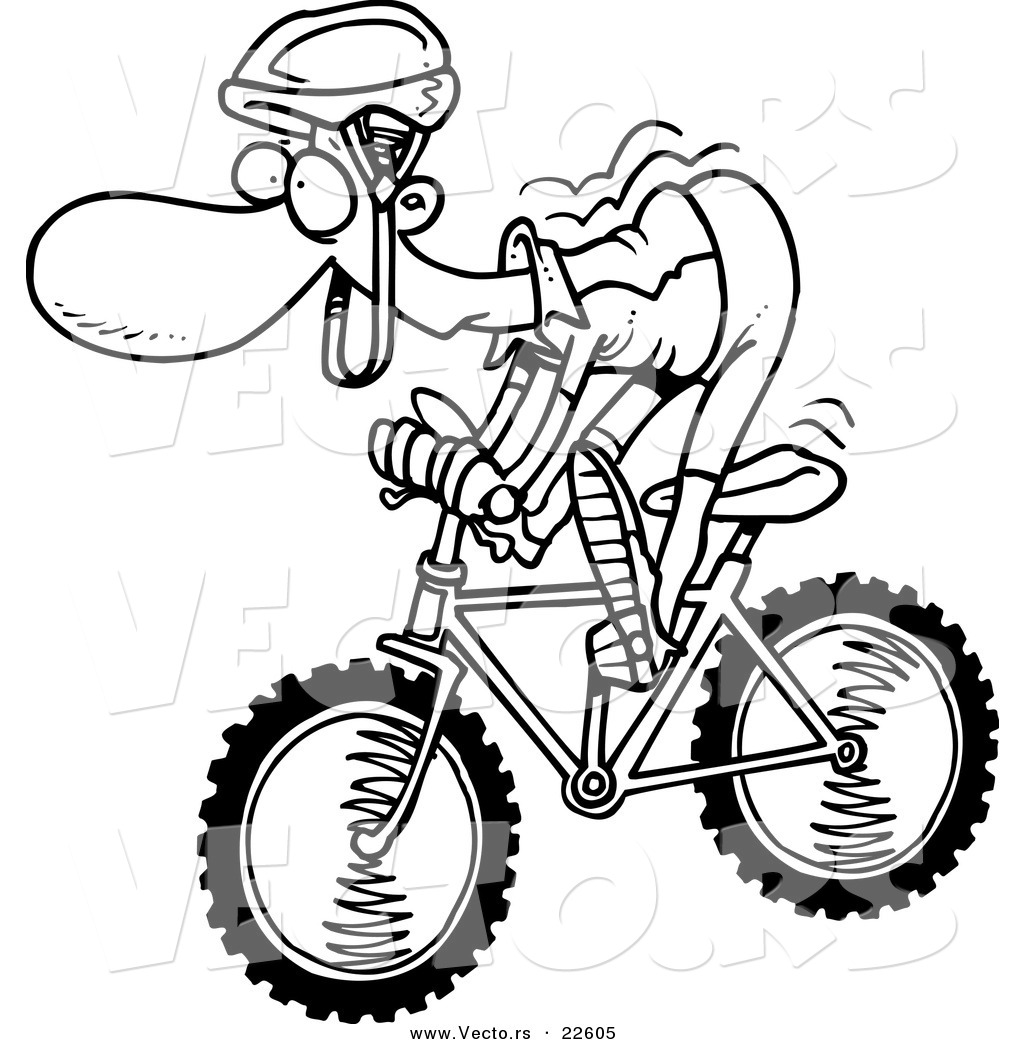
To learn to plan for a trip (weather, loading trailer, maps, team work & equipment.
To learn to ride on a variety of surfaces (roots, sand, mud, ruts).
To learn balance, body position, braking and steering to navigate intermediate tracks.
To learn how to prepare for a bike session (safety gear, clothes, equipment, saddle height, vocabulary)Success Criteria
Can ensure own safety and that of others when on on a bike trip.
Can explain mountain biking terms, methods & equipment.
Can mountain bike confidently and competently on intermediate tracks.We'll discuss:
Parts of a bike and maintenance checks before leaving.
Individual and group gear required (water, snacks, phone, map)
How trails are graded and the various local and national organisations involved in developing biking.Assessment
Your Mountain Biking will contribute towards Assessment 1 and will be self and teacher / instructor assessed.
Self-assessment: part of the evidence for your grade will come from your reflections in your learning journal.
Teacher / Instructor assessment: other evidence will come from observations and conversations during the sessions regarding your contribution, team work and skills developmentIn your Learning Journal, you should reflect on how you develop the skills and knowledge outlined in the Unit Standards. Your aim is to show that you know:
1. where you're at in your learning (what skills & knowledge do you have now)
2. where you're going (what skills & knowledge you are working towards)
3. how you'll get there (what next steps you'll take to learn these skills & knowledge) -
REFLECT / WHAIWHAKAARO learning intentions:
- We are REFLECTING on … movement skills and positive attitudes by… evaluating our experiences during white water kayaking, mountain biking, rock climbing trips, orienteering.
FOCUS / ARONGA learning intentions:
- We are FOCUSING on … movement skills by… developing knowledge of motor skills required for a variety of outdoor activities.
- We are FOCUSING on … positive attitudes by… identifying the attitudes required to accept challenges, learn new skills and strategies, and extend my abilities in a variety of outdoor activities.
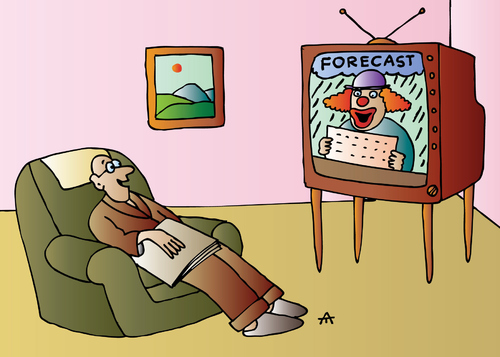 Learning Intentions
Learning Intentions
To learn to read a weather map and forecast the weather
To understand the causes of, and influences on, the weather (sun, hills, water, temperature, etc)
To investigate an aspect of the weather using scientific methods.Success Criteria
Can forecast weather from primary (observation) & secondary (maps) sources
Understands the risks & impact that weather can have an outdoor experiences
Can explain concepts that impact our weather in NZ (eg El Nino/La Nina)We'll discuss:
Types of weather system (cyclone, hurricane, warm & cold fronts, high & low pressure systems)
Impact on weather of sun, moon, topography, localised features eg lakes, city pollution
Types of cloud (cumulus, nimbus, cirrus, stratus)
Wind (direction, strength, causes, effects); precipitation (snow, rain, hail, fog)Assessment
Your work on weather will contribute towards Assessment 2 and will be self and teacher / instructor assessed.
Self-assessment: part of the evidence for your grade will come from your reflections in your learning journal.
Teacher / Instructor assessment: other evidence will come from observations and conversations during the sessions regarding your contribution, team work and skills developmentIn your Learning Journal, you should reflect on how you develop the skills and knowledge outlined in the Unit Standards. Your aim is to show that you know:
Weather investigation
1. where you're at in your learning (what skills & knowledge do you have now)
2. where you're going (what skills & knowledge you are working towards)
3. how you'll get there (what next steps you'll take to learn these skills & knowledge)
In particular, you will take it in turns to predict the weather for the class and will perform a scientific experiment to explore an aspect of weather. These might be proving that air moves clockwise round a low pressure system, warm air holds more moisture than cold air, air temperature causes clouds to rain, air pressure changes as a cold or warm front passes, 'old wives tales' accurately predict weather patterns (eg cows lie down before rain, pine cones predict rain, red sky at night shepherds' delight, etc)
Saturday 23 May 2020, mid-day Satellite 10pm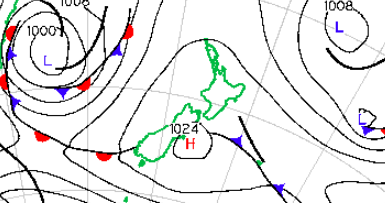
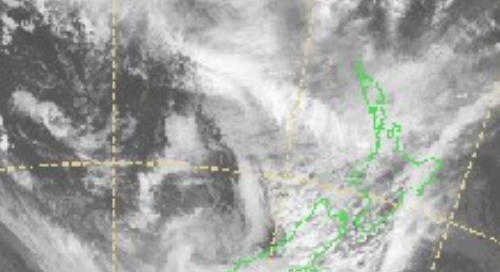
Sunday 24 May 2020, mid-day. Satellite 4pm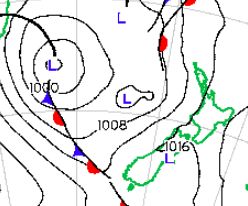
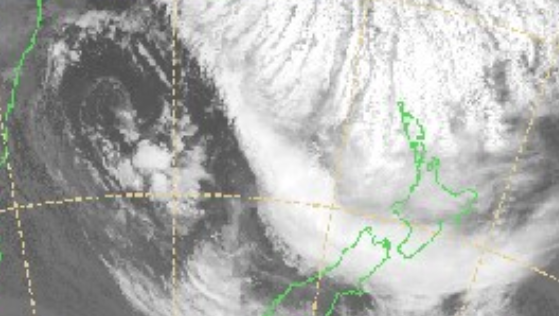
Monday 25 May 2020, 1am (forecast)
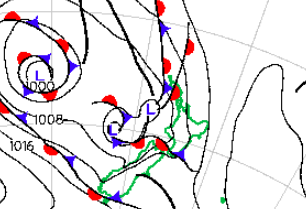
Tuesday 26 May 2020, 1am (forecast)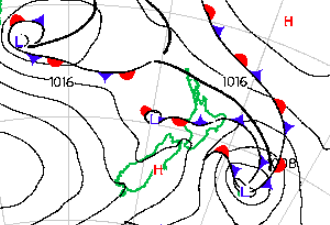
-
FOCUS / ARONGA learning intentions:
- We are FOCUSING on … movement skills by… developing knowledge of motor skills required for a variety of outdoor activities.
- We are FOCUSING on … positive attitudes by… identifying the attitudes required to accept challenges, learn new skills and strategies, and extend my abilities in a variety of outdoor activities.
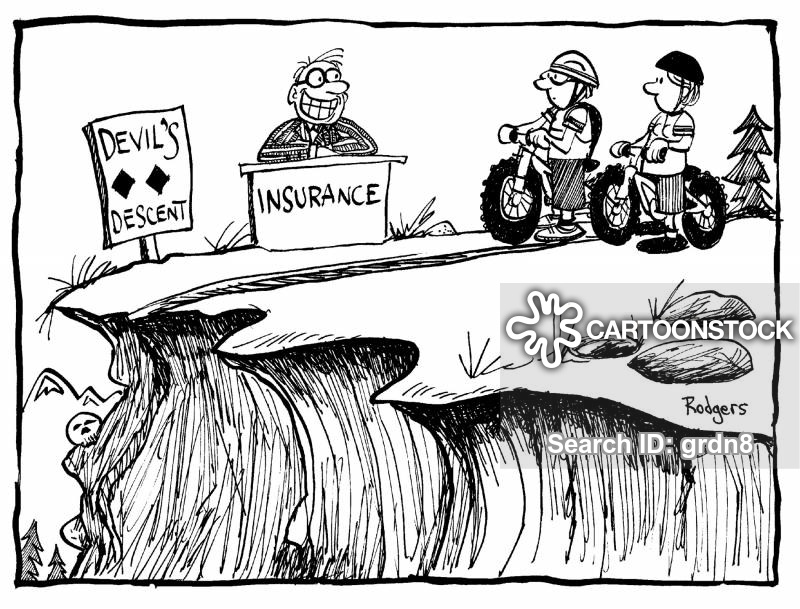 As a rough guide to our learning, we'll use the NCEA unit standards below. The content in these standards will help you when you complete you LEARNING JOURNAL, which will form part of your assessment.
As a rough guide to our learning, we'll use the NCEA unit standards below. The content in these standards will help you when you complete you LEARNING JOURNAL, which will form part of your assessment.NCEA Unit Std 20137 L1 (1 credit) Mountain bike on easy to intermediate terrain
https://www.nzqa.govt.nz/ncea/assessment/view-detailed.do?standardNumber=20137
NCEA Unit Std 457 L2 (2 credits) Mountain bike on intermediate to expert terrain
https://www.nzqa.govt.nz/ncea/assessment/view-detailed.do?standardNumber=457
One to work on by yourself:
NCEA Unit Std 20138 L2 (3 credits) Select, set up and maintain a mountain or cycle touring bike
https://www.nzqa.govt.nz/ncea/assessment/view-detailed.do?standardNumber=20138Resources
- Trail forks website Database of trails https://www.trailforks.com/nearby/?activitytype=1&z=10.0&lat=-37.01844&lon=175.01291
- Totara Park Mountain Bike Club website http://tpmtbc.org.nz/Home/
- Pohutukawa Coast Bike Club Facebook page http://www.facebook.com/pages/Pohutukawa-Coast-Bike-Club/117091788315880#!/pages/Pohutukawa-Coast-Bike-Club/117091788315880
- Auckland Mountain Bike Club website https://aucklandmtb.co.nz/club-rides/social-rides/
- Ride NZ website Information on trails eg 42 Traverse, etc http://www.ridenz.co/trails/
Videos
- Valparaiso, Chile Off road race https://www.redbull.com/int-en/tv/video/AP-1UMUKX6J91W11/finals-english
-
EXPLORE / TŪHURA learning intentions:
- We are EXPLORING … interpersonal skills by… connecting with other members of my class during ABL sessions and outdoor activities.
- We are EXPLORING … white water kayaking by… discovering a new enjoyable activity and how it contributes to personal well being.
- We are EXPLORING … mountain biking by… discovering a new enjoyable activity and how it contributes to personal well being.
- We are EXPLORING … rock climbing by… discovering a new enjoyable activity and how it contributes to personal well being.
- We are EXPLORING … orienteering by… discovering a new enjoyable activity and how it contributes to personal well being.
REFLECT / WHAIWHAKAARO learning intentions:
- We are REFLECTING on … movement skills and positive attitudes by… evaluating our experiences during white water kayaking, mountain biking, rock climbing trips, orienteering.
FOCUS / ARONGA learning intentions:
- We are FOCUSING on … movement skills by… developing knowledge of motor skills required for a variety of outdoor activities.
- We are FOCUSING on … positive attitudes by… identifying the attitudes required to accept challenges, learn new skills and strategies, and extend my abilities in a variety of outdoor activities.
FOCUS / ARONGA learning intentions:
- We are FOCUSING on … movement skills by… developing knowledge of motor skills required for a variety of outdoor activities.
- We are FOCUSING on … positive attitudes by… identifying the attitudes required to accept challenges, learn new skills and strategies, and extend my abilities in a variety of outdoor activities.
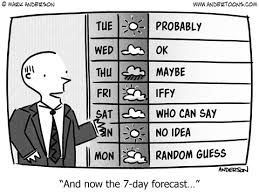 As a rough guide to our learning, we'll use the NCEA unit standards below. The content in these standards will help you when you complete your LEARNING JOURNAL, which will form part of your assessment.
As a rough guide to our learning, we'll use the NCEA unit standards below. The content in these standards will help you when you complete your LEARNING JOURNAL, which will form part of your assessment.NCEA Unit Std 20159 L2 (2 credits) Gather and apply weather information to an outdoor recreation activity
https://www.nzqa.govt.nz/ncea/assessment/view-detailed.do?standardNumber=20159
Resources
One to aim for in future:
NCEA Unit Std 20160 L3 (2 credits) Demonstrate knowledge of weather processes and their effects in NZ
https://www.nzqa.govt.nz/ncea/assessment/view-detailed.do?standardNumber=20160Weather Watch website https://www.weatherwatch.co.nz/
- Meteorological Society of NZ https://www.metsoc.org.nz/weather-resources/
- Victoria University weather service maps (show wind direction, pressure & rain) http://www.metvuw.com/forecast/forecast.php?type=rain®ion=nzni&noofdays=1
- Mountain Safety Council website https://www.mountainsafety.org.nz/resources/outdoor-safety-code/be-aware-of-the-weather/
- Global air & water movements (High & low pressure systems - converge,
diverge, rotate in lower atmosphere).
Effect of unequal heating of land - global atmospheric circulation.
- Movement of water in 'water cycle'
- Seasonal impacts, equinox & solstice - passage & position of Earth around Sun
- Weather features resulting from air/water movement - Katabatic / Anabatic winds
- Vertical air movement - changes in temperature & pressure
- Clouds and fog - humidity, temperature, wind, lifting processes. Types of low, medium and high level clouds.
- Influences on NZ’s weather - global origins of air masses, geographic (lake, mountains, valleys, global location, orientation of land forms.
- Seasonal variations on NZ weather patterns - wind direction / speed, precipitation, sunshine hours, temperature.
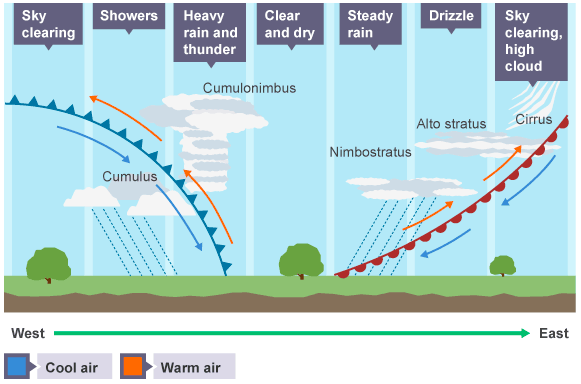
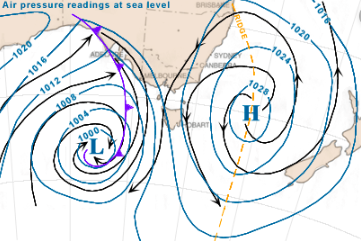
Here's a great documentary about NZ's weather and what influences it, by Weatherman Jim Hickey
For anyone who's interested, here's an interesting blog post about many weather features that we've discussed in class:
http://bleedingheartindependent.blogspot.com/ -
REFLECT / WHAIWHAKAARO learning intentions:
- We are REFLECTING on … movement skills and positive attitudes by… evaluating our experiences during white water kayaking, mountain biking, rock climbing trips, orienteering.
FOCUS / ARONGA learning intentions:
- We are FOCUSING on … movement skills by… developing knowledge of motor skills required for a variety of outdoor activities.
- We are FOCUSING on … positive attitudes by… identifying the attitudes required to accept challenges, learn new skills and strategies, and extend my abilities in a variety of outdoor activities.
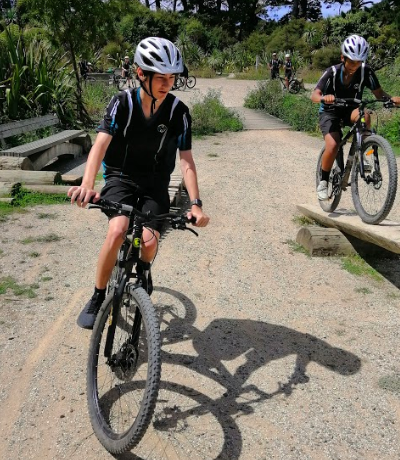
-
REFLECT / WHAIWHAKAARO learning intentions:
- We are REFLECTING on … movement skills and positive attitudes by… evaluating our experiences during white water kayaking, mountain biking, rock climbing trips, orienteering.
FOCUS / ARONGA learning intentions:
- We are FOCUSING on … movement skills by… developing knowledge of motor skills required for a variety of outdoor activities.
- We are FOCUSING on … positive attitudes by… identifying the attitudes required to accept challenges, learn new skills and strategies, and extend my abilities in a variety of outdoor activities.

Each of us will read a book related to Outdoor Education and write a brief book review in a shared doc.
Assessment: Learning JournalsFinish and submit your Kayaking Learning Journal and ensure that you're up to date with your Mountain Biking one.
Rescued after 19 days in the bush
https://www.nzherald.co.nz/nz/news/article.cfm?c_id=1&objectid=12336027
Teenager rescued after trying to cross Cook Strait in a dinghy
https://www.newstalkzb.co.nz/news/national/teenager-rescued-after-trying-to-cross-cook-strait-in-a-dinghy/
Storms and flooding this long weekend
https://www.nzherald.co.nz/nz/news/article.cfm?c_id=1&objectid=12336238
Storms explained: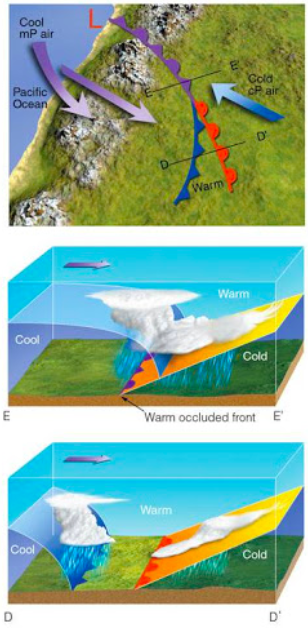
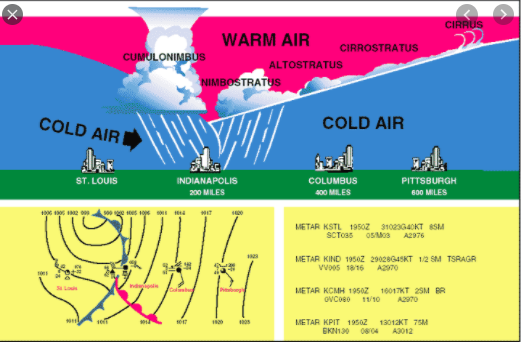
An occluded front means that a cold front and a warm front are acting on the same area. Clouds and rain from both fronts combine over the Coromandel!
The diagrams here look like they are of the Northern Hemisphere (spinning anti-clockwise around a Low pressure).
Remember that for NZ, in the Southern Hemisphere, the fronts move clockwise around a Low pressure. -
EXPLORE / TŪHURA learning intentions:
- We are EXPLORING … interpersonal skills by… connecting with other members of my class during ABL sessions and outdoor activities.
- We are EXPLORING … white water kayaking by… discovering a new enjoyable activity and how it contributes to personal well being.
- We are EXPLORING … mountain biking by… discovering a new enjoyable activity and how it contributes to personal well being.
- We are EXPLORING … rock climbing by… discovering a new enjoyable activity and how it contributes to personal well being.
- We are EXPLORING … orienteering by… discovering a new enjoyable activity and how it contributes to personal well being.
REFLECT / WHAIWHAKAARO learning intentions:
- We are REFLECTING on … movement skills and positive attitudes by… evaluating our experiences during white water kayaking, mountain biking, rock climbing trips, orienteering.
FOCUS / ARONGA learning intentions:
- We are FOCUSING on … movement skills by… developing knowledge of motor skills required for a variety of outdoor activities.
- We are FOCUSING on … positive attitudes by… identifying the attitudes required to accept challenges, learn new skills and strategies, and extend my abilities in a variety of outdoor activities.
Learning Journals
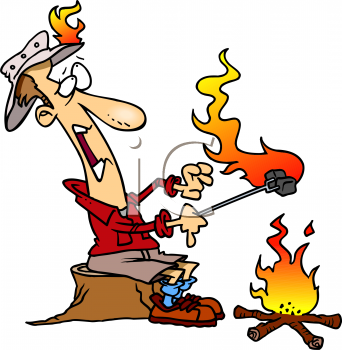
1. Update your Journal (kayak, bike, camping)
2. Finish your book review.
3. Submit your Weather documentAssessment 1
Through your own reflections, observations by the teacher, and conversations with teachers & instructors, the following rubric will be completed.
It relates to kayaking, camping, weather and book review. You'll each be part of the process and discuss your learning with Mr Suckling.
Climbing will be assessed in Terms 3&4.
-
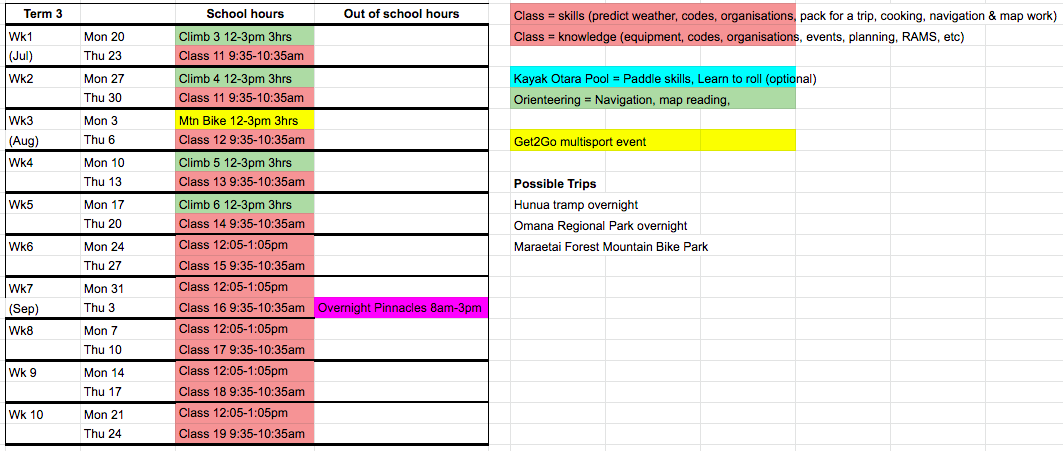
As a rough guide to our learning, we'll use the NCEA unit standards below. The content in these standards will help you when you complete you LEARNING JOURNAL, which will form part of your assessment.
NCEA Unit Std 425 L2 (3 credits) Experience day tramps
https://www.nzqa.govt.nz/ncea/assessment/view-detailed.do?standardNumber=425
NCEA Unit Std 426 L2 (3 credits) Experience camping
https://www.nzqa.govt.nz/ncea/assessment/view-detailed.do?standardNumber=426You might find these outlines of L3 standards useful or interesting:
Bush survival skills, Leading an overnight camp, Bushwalking knowledge & skills
https://www.nzqa.govt.nz/ncea/assessment/search.do?query=Tramping&view=all&level=03Resources
Hiking NZ website https://hikingnewzealand.com/blog/environmental-care-code/ -
Here are a few video clips to show the range of types of climbing:
https://www.youtube.com/watch?
v=iDlLCKnOB2M
https://www.youtube.com/watch?v=T06ksTRLBx4
https://www.youtube.com/watch?v=D2OCiJ7zces
https://www.youtube.com/watch?v=I2vJ6-eYfVg
https://www.youtube.com/watch?v=EdMsY5st2J8
https://www.youtube.com/watch?v=LBi22AKvsK0 -
Learning Intentions
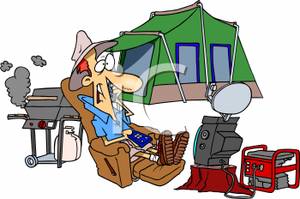
To learn to plan, pack and take part in overnight camping.
To experience and enjoy being away from some of the comforts of home.Success Criteria
Can prepare and pack for overnight camping, including individual and group gear.
Can collaborate and support team members in an unfamiliar situation.
Can cook on a gas stove and light an open fire safely and effectively.
Can ensure the protection of the environment when camping overnight.We'll discuss:
Preparing for camping (group gear - tent, fly, stove, 1st Aid kit; personal gear - clothes; food)
Establishing campsites (vegetation, contours, weather, hazards, water, toilets, cooking)
Environmental impact (waterways, vegetation, terrain)
Safe & hygienic practices (toilets, waste, water, food)
Living skills in camp (cooking, eating, hygiene)
Equipment (stove types, refuelling, lighting, storage, operation
Care for equipment, self & others (privacy, sleep, culture, personal space) -
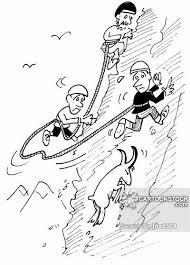 As a rough guide to our learning, we'll use the NCEA unit standards below. The content in these standards will help you when you complete you LEARNING JOURNAL, which will form part of your assessment.
As a rough guide to our learning, we'll use the NCEA unit standards below. The content in these standards will help you when you complete you LEARNING JOURNAL, which will form part of your assessment.NCEA Unit Std 20152 L1 (1 credit) Experience and complete abseiling sessions
Resources
https://www.nzqa.govt.nz/ncea/assessment/view-detailed.do?standardNumber=20152
NCEA Unit Std 20210 L1 (1 credit) Experience rock climbing
https://www.nzqa.govt.nz/ncea/assessment/view-detailed.do?standardNumber=20210
NCEA Unit Std 444 L2 (1 credit) Demonstrate basic rock climbing movement
https://www.nzqa.govt.nz/ncea/assessment/view-detailed.do?standardNumber=444
NCEA Unit Std 20157 L2 (3 credits) Demonstrate use of basic rope systems for top rope rock climbing & abseiling
https://www.nzqa.govt.nz/ncea/assessment/view-detailed.do?standardNumber=20157- Extreme Edge Panmure ‘all day’ $17pp (10+ climbers). Grade 19 Lead Clinic for lead climbing http://www.extremeedge.co.nz/
Videos
- Alex Honnold describes his solo free climb of El Capitan in Yosemite National Park
- Ibex teaching us climbing skills
-
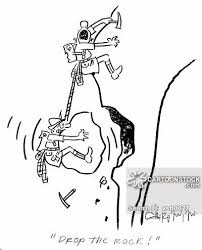 Learning Intentions
Learning Intentions
To learn safety preparations - equipment (harness, carabiners, etc)
To learn roles, responsibilities & communication of belayer & climber
To learn to climb wasting least energy, strength and stamina.
To learn the different methods & styles of recreational & sports climbingSuccess Criteria
Can work with a climbing buddy to have an enjoyable & safe climb experience
Can climb a range of basic to intermediate indoor climb routes
Can explain the grading system of routes and the equipment usedWe'll discuss:
- Some rope-work / knots
- Equipment (eg cams, chocks, belay devices)
- Meaning of vocabulary used in the sport
- Skills in climbing (especially to save forearms!) -
Revision of weather and navigation.
Here are some quizzes for you to work on. Remember that you are preparing for a trip in serious terrain and need to practise your skills and knowledge.
1. Weather https://www.proprofs.com/quiz-school/story.php?title=weather-unit-test-5th-grade-level
2. Navigation https://www.ttc.org.nz/pmwiki/pmwiki.php/Bushcraft/MapAndCompass scroll down to "map & compass exercise #1" and then #2 and #3. There's a link to download a map that you'll need (link also here http://www.topomap.co.nz/NZTopoMap?v=2&ll=-41.322865, )174.720609&z=11
(you'll have to download, open, enlarge (by clicking the + icon a few times), and move around the map using the up and down arrows on their keyboard).3. If you need another quiz (you won't), use this navigation one: https://scoutingmagazine.org/2014/02/quiz-well-know-use-map-compass/ (American but very useful)The next topic will be preparing and packing gear.
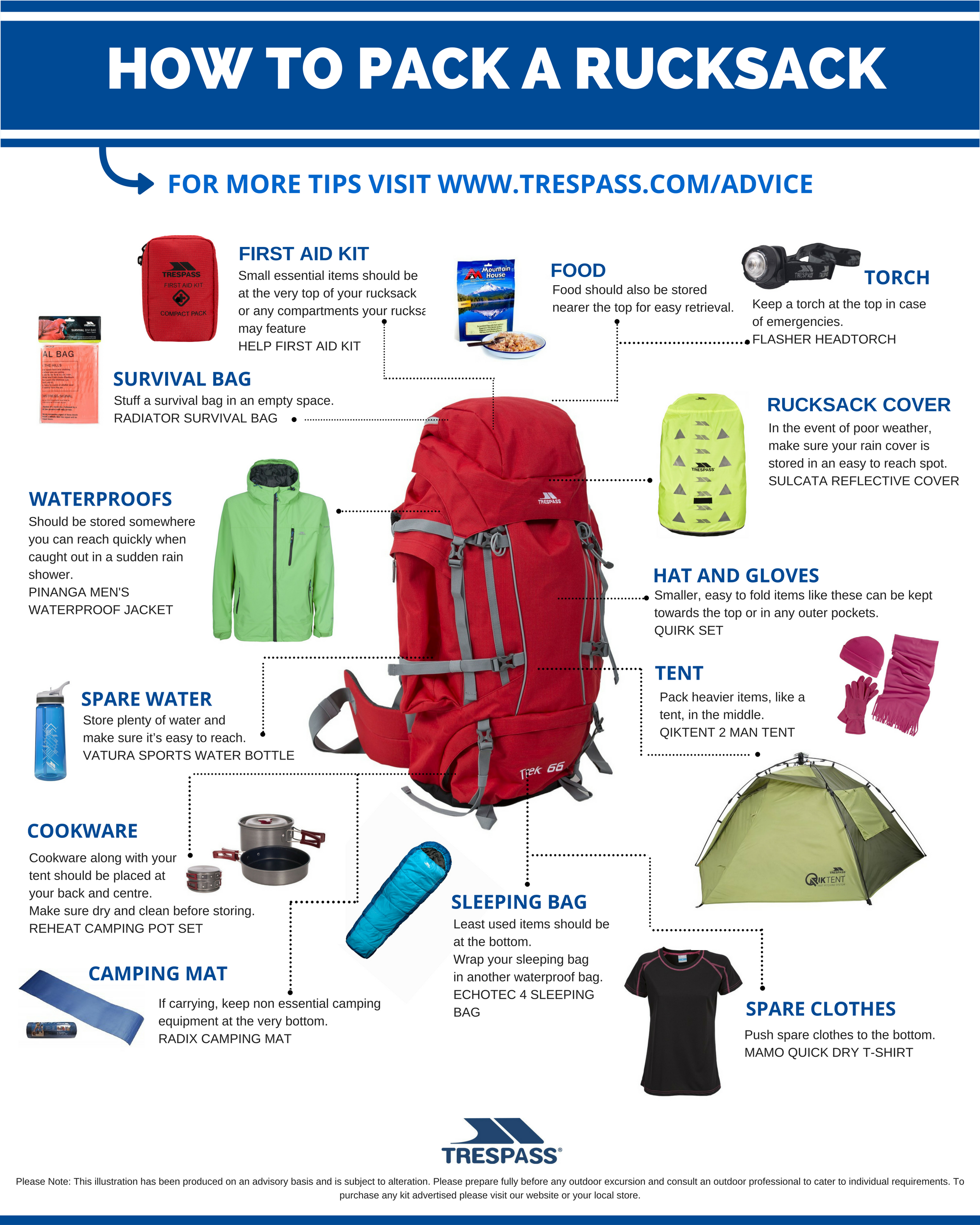
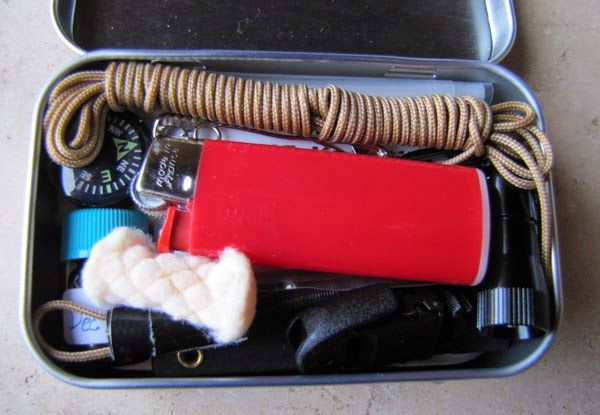
-
Work through these 5 sections to check that we are ready for the Pinnacles trip:
-
Here's a video by Ray Mears about surviving in the NZ outdoors.
As you watch the video, make notes in the shared Google Doc issued in Google Classroom.
The headings are:
- Places, regions and mountain ranges visited throughout the video (north & south islands)
- Mistakes made by trampers & mountaineers described (eg father & son trampers and Mark Inglis on Mt Cook)
- Rescue techniques & methods to survive (eg those used by Mountain Rescue in the case studies above)
- Animals mentioned - pests and how they're controlled; environmental business based on wildlife.
- History and Te Ao Maori - traditional methods & materials used for shelter, fire, food, etc.
-
Duder Regional Park Hike
Learning Intentions:
Discover the wildlife and landscapes in Duder Regional Park, and understand why it's important to take care of our natural environment.
Learn how to read maps, use a compass, and find your way through the park, so you can confidently explore.
Find out how to stay safe on our outdoor adventures by recognizing and managing any potential risks along the way.
Success Criteria:
Identify and name at least three different plants or animals you encounter during the hike
Successfully use a map and compass to find your way to a predetermined location during the hike.
Point out at least two potential hazards during the hike and suggest ways to stay safe
We’ll discuss:
Auckland Regional Park - Duder’s Website
Navigation and map reading
Health and Safety planning - being prepared
Week Tasks/Activities
Pinnacle Debrief
Student Conferences on Assessment 2
Planning for Duder Regional Park and Assessment.
-
Duder Regional Park Hike
Learning Intentions:
Discover the wildlife and landscapes in Duder Regional Park, and understand why it's important to take care of our natural environment.
Learn how to read maps, use a compass, and find your way through the park, so you can confidently explore.
Find out how to stay safe on our outdoor adventures by recognizing and managing any potential risks along the way.
Success Criteria:
Identify and name at least three different plants or animals you encounter during the hike
Successfully use a map and compass to find your way to a predetermined location during the hike.
Point out at least two potential hazards during the hike and suggest ways to stay safe
We’ll discuss:
Auckland Regional Park - Duder’s Website
Navigation and map reading
Health and Safety planning - being prepared
Week Tasks/Activities
Duder Regional Park Hike and Assessment
Student Conferences Continued
-
Bushcraft: - Local Park
Learning Intentions:
Learn how to pitch a tent successfully, including setting up the tent securely and ensuring it's stable and weatherproof.
Develop the skills needed to prepare and cook food outdoors safely and efficiently
Practice the principles of "Leave No Trace" and apply them throughout the lesson, respecting the environment
Practice effective communication and teamwork when working with others
Success Criteria:
Successfully set up a tent that is stable, weatherproof, and secure.
Safely and efficiently prepare and cook a meal using outdoor cooking equipment, following instructions and guidelines.
Practice "Leave No Trace" principles by packing out all waste, and minimizing environmental impact
Work collaboratively with others, effectively communicating and assisting team members as needed
We’ll discuss:
Revisit tent pitching and site selection
Cooking in the great outdoors
Health and Safety
Adventure Based Learning
Week Tasks/Activities
Local Park Challenge - Students use their Bush Craft skills for cooking and tent pitching
Adventure Base Learning - Students work on designing their own ABL activity with a select focus: -Leadership
Trust
Cooperation
Creativity
Problem Solving
Confidence
-
Mountain Biking:
Learning Intentions
To learn to plan for a trip (weather, loading trailer, maps, team work & equipment.
To learn to ride on a variety of surfaces (roots, sand, mud, ruts).
To learn balance, body position, braking and steering to navigate intermediate tracks.
To learn how to prepare for a bike session (safety gear, clothes, equipment, saddle height, vocabulary)Success Criteria
Can ensure own safety and that of others when on on a bike trip.
Can explain mountain biking terms, methods & equipment.
Can mountain bike confidently and competently on intermediate tracks.We'll discuss:
Parts of a bike and maintenance checks before leaving.
Individual and group gear required (water, snacks, phone, map)
How trails are graded and the various local and national organisations involved in developing biking.Week Tasks/Activities
Students continue planning ABL activity
Preparation for Totara MTB - the final ride 2024
-
Omana to Duder Regional Park - Coastal Challenge
Learning Intentions:
Discover the wildlife and landscapes along our coastal walk, and understand why it's important to take care of our natural environment.
Learn how to read maps, use a compass, and find your way through the park, so you can confidently explore.
Find out how to stay safe on our outdoor adventures by recognizing and managing any potential risks along the way.
Success Criteria:
Identify and name at least three different plants or animals you encounter during the coastal walk
Successfully use a map to find your way to a predetermined location during the walk.
Point out at least two potential hazards during the walk and suggest ways to stay safe
We’ll discuss:
Auckland Regional Parks Omana and Duder
Topo Map and Google Maps
Navigation and map reading
Health and Safety planning - being prepared
Week Tasks/Activities:
Preparation for Omana to Duder Walk (Navigation, Plant Identification, H&Safety
Omana to Duder Hike and Conservation Challenge.
-
No exam in Outdoor Education :)
-
Mangemangeroa - Coastal Walk
Learning Intentions:
Discover the wildlife and landscapes along our coastal walk, and understand why it's important to take care of our natural environment.
Learn how to read maps, and find your way through the park, so you can confidently explore.
Find out how to stay safe on our outdoor adventures by recognizing and managing any potential risks along the way.
Success Criteria:
Identify and name at least three different plants or animals you encounter during the coastal walk
Successfully use a map to find your way to a predetermined location during the walk.
Point out at least two potential hazards during the walk and suggest ways to stay safe
We’ll discuss:
Mangemangeroa Park
Topo Map and Google Maps
Navigation and map reading
Health and Safety planning - being prepared
Week Tasks/Activities
Mangemangeroa Coastal Challenge:
Navigation, Plant Identification, Health and Safety
-
Orienteering:
Learning Intentions
To learn to read an orienteering map (scale, features, contours, orientation).
To learn to navigate a prepared course (distances, direction, pace).
To experience participating in an organised local orienteering event.Success Criteria
Can orientate a map and use a compass.
Can understand map features and navigate efficiently on varied terrain.We'll discuss:
- Orientating maps with & without a compass)
- Relating map symbols to terrain and vice versa
- Orienteering symbols
- Skills (eg thumbing the map to follow ground progress)
- Tactics to complete a course individually and within the set time.Week Tasks/Activities
Course Review with student feedback
Duder Orienteering TBC due to School Wide Activities
-
Final Outdoor Ed Classes in Week 9 - Graduation on Monday Week 10
-
On Tuesday, this week we're taking part in a team multi-sport event called Get2Go.
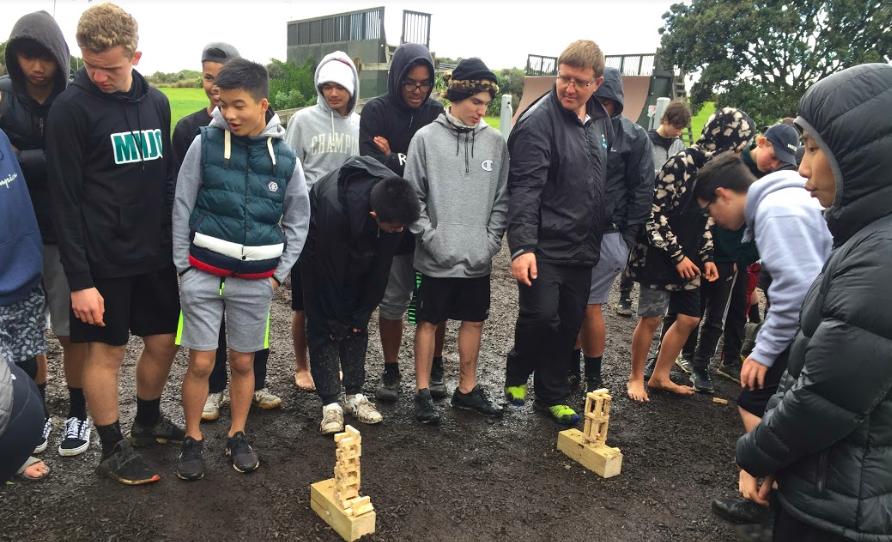
http://www.hillaryoutdoors.co.nz/juniorget2go/You'll drive between venues and activities will include canoeing, climbing, sailing, orienteering and more.
We are in two groups of 8. Good Luck!
Some weather resources:
- https://about.metservice.com/our-company/learning-centre/how-to-read-weather-maps/
- https://www.weatherwatch.co.nz/content/quick-kiwi-weather-quiz
